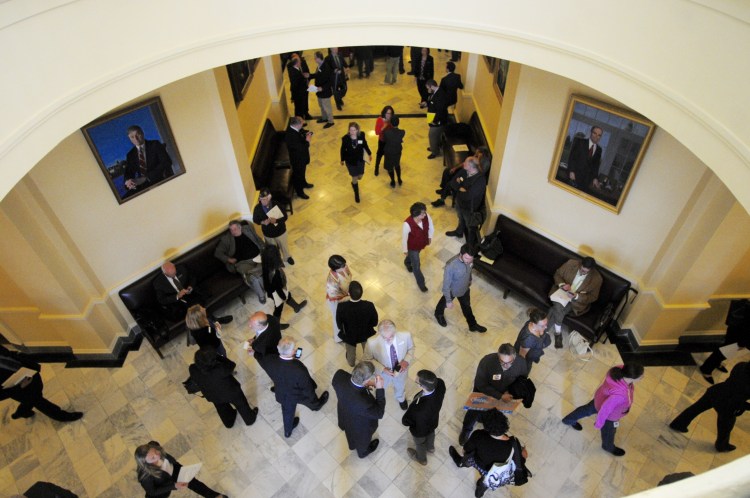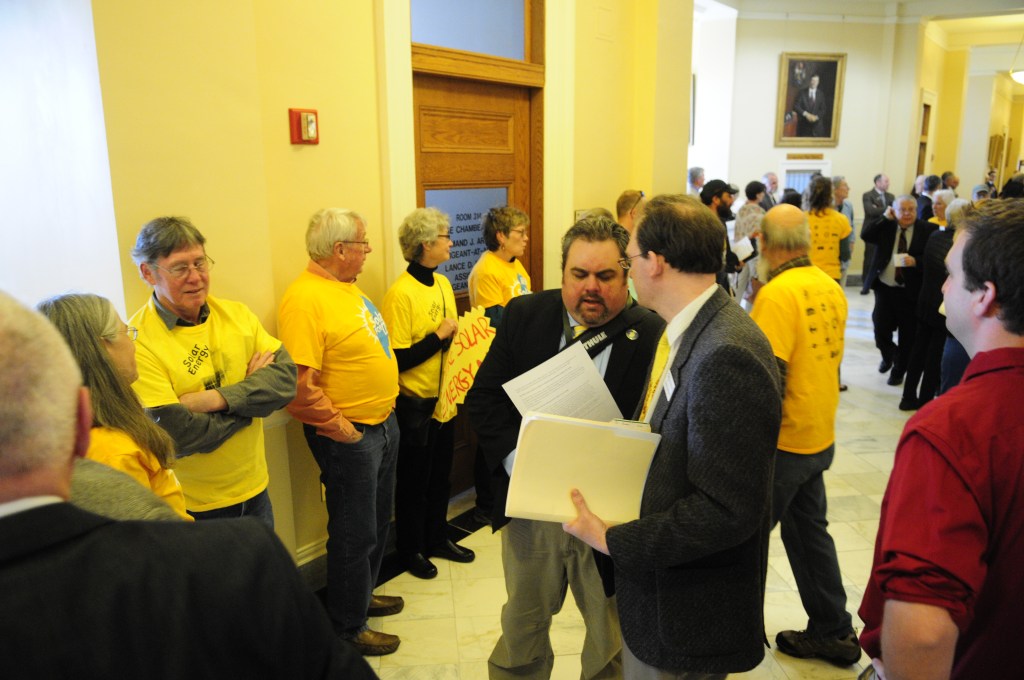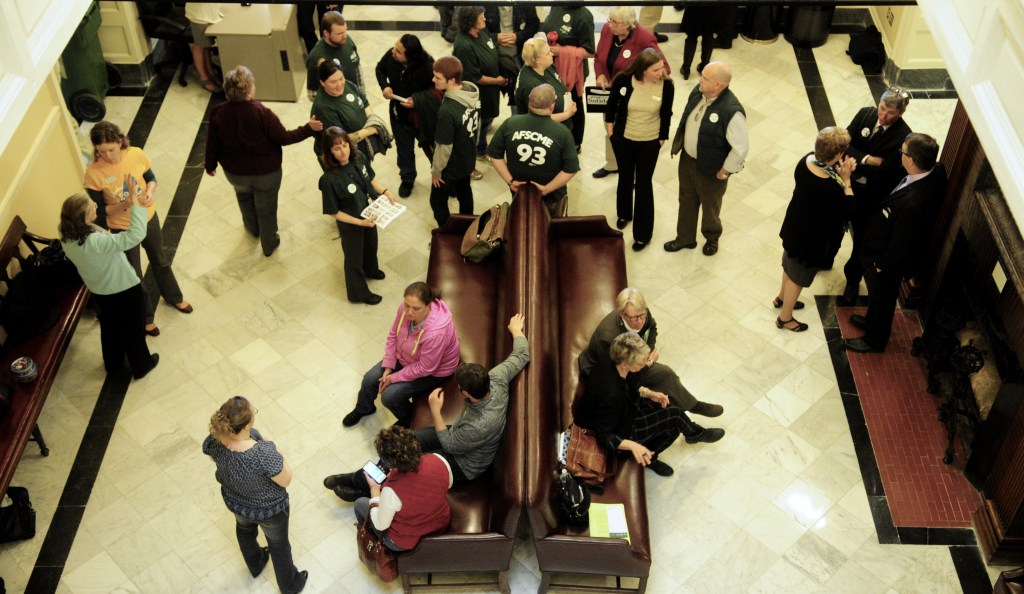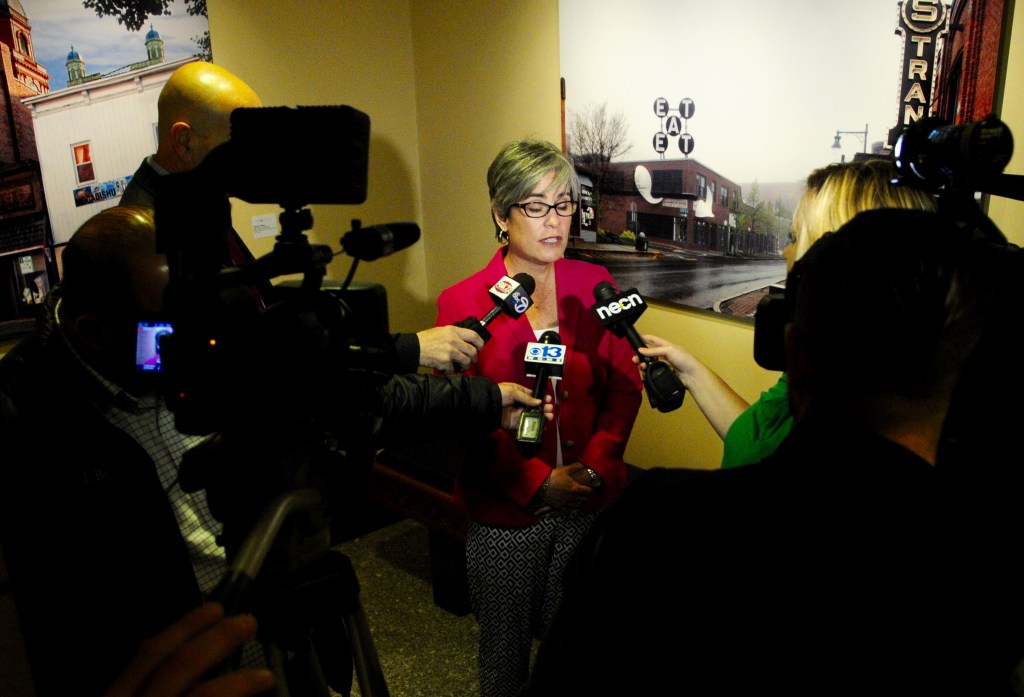AUGUSTA – Solar energy, county jail funding and access to the live-saving drug naloxone will be some of the big issues lawmakers will debate on Friday as they take up dozens of bills vetoed by Gov. Paul LePage.
The vetoed bills run the gamut from local initiatives – such as funding for education programs in Androscoggin County – to complex, statewide issues dealing with heroin and energy policy. Yet lawmakers are also likely to debate a minimum wage increase as well as Medicaid expansion – two contentious issues that remained stalled in the Legislature.
All told, lawmakers will decide whether to uphold or overturn at least 33 LePage vetoes handed down since the Legislature adjourned on April 16, although the governor had until day’s end Thursday to veto others. With the outcome already known on many vetoes, legislative leaders are hoping for a smooth end to a largely unremarkable 2016 session.
“I don’t think there will be long debates on a lot of bills,” said House Speaker Mark Eves, D-North Berwick.
“It should be a short day,” added Senate President Mike Thibodeau, R-Winterport.
NALOXONE: A LIFE SAVER OR LIFE EXTENDER?
Among all of LePage’s vetoes this legislative session, none have prompted more debate than his veto of a bill that would allow pharmacists to dispense naloxone without a prescription.
Also known by the brand name Narcan, naloxone reverses the potentially deadly effects of an overdose from heroin or other opiates. The antidote is already available by prescription to friends and family of individuals with opiate addictions in Maine, however L.D. 1547 would add Maine to the list of more than 30 states that allow pharmacists to dispense it without a prescription.
LePage sparked anger among some when he wrote in his veto letter that naloxone “does not truly save lives, it merely extends them until the next overdose.”
“Creating a situation where an addict has a heroin needle in one hand and a shot of naloxone in the other produces a sense of normalcy and security around heroin use that serves only to perpetuate the cycle of addiction,” LePage wrote.
Dr. Joseph Valdez, medical director of outpatient addiction services at Portland’s Mercy Hospital, was among those that spoke out against what he called LePage’s “frustrating and somewhat baffling” reasoning behind the veto. Valdez said people need to understand that addiction is a medical disease and “not the result of a bunch of bad people carrying on.”
“We have an epidemic of opiate addiction and young people are dying of overdoses, so we should be doing everything we can to address that,” said Valdez. “I have many patients who have experienced an overdose or witnessed an overdose who, because they were administered naloxone or witnessed it, are now being given a chance to get into treatment.”
The bill passed the Maine House by a significant margin earlier this month but still fell just shy of the two-thirds majority needed to override a gubernatorial veto. Supporters believe they now have enough votes to overturn the veto, however.
“Instead of it being a close vote, I think it is going to be overwhelming,” Rep. Sara Gideon, D-Freeport, said Wednesday.
SOLAR BILL
After last-minute negotiations failed, LePage vetoed a bill that aims to increase solar energy generation in Maine while changing the “net metering” program in which solar customers receive credits for electricity fed back into the grid.
There is a lot riding on the solar bill, which has arguably seen more lobbying this session than any other measure.
Supporters, who plan a large rally prior to Friday’s votes, say the bill would provide a much-needed boost to an industry that could add as many as 650 jobs in Maine. Opponents, led by LePage, said the final version does not do enough to protect traditional ratepayers from having to pick up the tab for expanding an industry that they contend largely benefits the wealthy.
“I tried to negotiate in good faith with Democrats . . . (but) we could not reach an agreement,” LePage wrote in his veto letter issued Wednesday. “They are not serious about reducing the price of energy for Maine families or job creators.”
The bill, L.D. 1649, passed the House on a vote of 91-56 earlier this month. But that is still roughly 10 votes shy of the number needed to override the veto.
“I have received more emails during the solar conversation . . . than on any other bill,” said Sen. Justin Alfond, D-Portland, the Senate minority leader. “We’ll see. It starts in the House and I’d love to see it get to the Senate.”
RIVERVIEW WAGES
Despite all of the attention paid to Riverview Psychiatric Center in recent months, lawmakers were unable to find compromise on how to deal with patients sent to the Augusta hospital by the criminal justice system.
One Riverview-related measure that managed to survive the legislative process, however, would provide pay increases to workers at Riverview and at Dorothea Dix Psychiatric Center in Bangor.
The bill, L.D. 1645, would provide a $2-per-hour pay raise to mental health workers, licensed practical nurses and the acuity specialists trained to respond to individuals in “psychiatric crisis.” The bill would also increase the hourly pay of some nurse and psychologist positions by $4.
Bill advocates, led by the unions representing Riverview workers, argued the pay raises were necessary to address a staff retention and recruitment “crisis” at the 92-bed psychiatric hospital. Riverview and LePage administration officials have countered, however, that the hospital has been filling vacancies and a pay raise would not address other challenges.
“The easiest thing the Legislature can do to help Riverview is to stop subjecting it to a constant barrage of hearings reports and studies,” LePage wrote in his veto letter. “As a recent Court Master review stated, one of the greatest barriers to recruitment at Riverview is the negative publicity it constantly receives in the media – publicity usually generated by legislative hearings and press releases.”
FUNDING FOR COUNTY JAILS
Another bill vetoed by LePage, L.D. 1614, would provide $2.4 million in emergency funding to Maine’s county jails both this year and next year.
Last year, lawmakers gave control of the jails back to the counties and eliminated the state Board of Corrections. But county officials have said they need another $2.4 million per year to operate the jails.
County jails have been a flashpoint for the governor for several years. LePage argues that he doesn’t care who runs the jails – whether the state or the counties – but that which ever arm of government does should be responsible for paying the bills.
“Currently, county funding for operation of the jails is capped,” LePage wrote in his veto message. “If counties spend above the cap, as they invariably do, then the state is asked to provide supplemental funding to cover the difference. For too long, state taxpayers have had to pick up the tab for the cost of the county jails because, due to the cap, there is no incentive for counties to rein in jail spending.”
Bill supporters said LePage’s veto will only shift the burden onto local taxes.
MINIMUM WAGE – AGAIN
Although not a gubernatorial veto, House lawmakers are also expected to officially kill a bill seeking a more modest minimum wage increase than the $12-an-hour proposal on the November ballot.
Earlier this month, Republicans brought forward a proposal to increase Maine’s minimum wage in several stages from $7.50 an hour to $10 an hour in 2019. The proposal, which is backed by major business groups, is offered as an “emergency measure” in order to take effect before Maine voters decide this November on the $12-an-hour proposal sought by progressive groups and labor unions.
The bill passed the Republican-controlled Senate but with less than the two-thirds needed to become law. Eves said Thursday that he fully expects the Democratic-controlled House to kill the bill.
Comments are not available on this story.
Send questions/comments to the editors.






